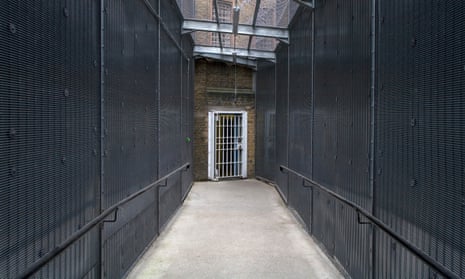Fifty-two people are being held in prison units in England and Wales in conditions that a UN human rights expert has said may amount to torture, the Guardian has learned.
Close supervision centres (CSCs) hold some of the most dangerous men in the prison system in small, highly supervised units within high-security jails in conditions previously described by the prisons inspector as “the most restrictive … with limited stimuli and human contact”.
Nils Melzer, the UN special rapporteur on torture, has raised concerns that they expose inmates to prolonged and indefinite periods of isolation, while Amnesty International UK has previously described CSCs as akin to “cruel, inhumane or degrading treatment”.
A freedom of information request from the Guardian revealed that 52 people were being held in CSCs as of 1 May. Of the inmates, 20 – approximately 40% – were not white British, compared with 14% of the population of England and Wales and 27% of the prison population as a whole. The Ministry of Justice (MoJ) declined to provide a breakdown of the ethnicity of those who were not white British, saying it could lead to them being identified.
Six of the 52 had been convicted of wounding with intent, 10 for murder and 32 for attempted murder. The offences of the others were not disclosed.
A 2015 report by the Prison Reform Trust found that half of CSC inmates at the time were Muslim, though Muslims make up only 4% of the population of England and Wales and accounted for 16% of the prison population last year. The average length of stay of all prisoners in such units was 40 months.
Melzer has described the conditions in CSCs as “comparable to solitary detention”. The Nelson Mandela rules, international non-binding standards, state that no prisoner should be held in prolonged solitary confinement, defined as more than 15 consecutive days. Solitary confinement is defined as being confined for at least 22 hours a day “without meaningful human contact”.
Sharon Shalev, a research associate at the University of Oxford’s Centre for Criminology and co-author of the Prison Reform Trust report, said conditions varied at the five prisons with CSCs, which have a total capacity of 54 inmates, but added: “There is no doubt – the literature is very, very clear – that solitary confinement is harmful, certainly when it goes on for such a long time and added to the fact that it’s indefinite. Fifteen days is almost nothing compared to some of the length of time that people spend in CSCs. Even if people are treated fairly and receive good nutrition, it’s harmful.
“I’m not sure about the entry criteria, but certainly it’s not so clear how people can leave the CSC, how they can work towards what they need to actually do. That was one of the findings of our report.”
Melzer highlighted the case of Kevan Thakrar, who has been kept in CSCs for the last 11 years. The special rapporteur said in May: “When used for more than 15 consecutive days, these conditions of detention amount to torture or other cruel, inhuman or degrading treatment or punishment and, therefore, are neither legitimate nor lawful.”
The special rapporteur wrote to the UK government in March about Thakrar’s case and CSCs more widely. Among the issues he asked for clarification on were safeguards taken to ensure that prisoners in CSCs are not subjected to “prolonged or unnecessary solitary confinement” and “measures taken to end solitary confinement and isolation of persons with mental conditions and psychosocial disabilities experiencing a mental health crisis”.
An MoJ spokesperson said: “We strongly disagree with this depiction of close supervision centres, which are only used when a prisoner poses a significant risk of harm to others.
“These prisoners are entitled to legal representation at monthly reviews, as well as education, exercise and support from expert staff and clinicians to address their behaviour so they can return to the main prison population.”
